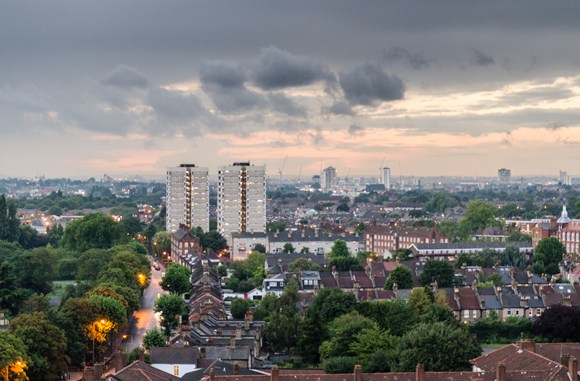London’s children do not consistently have enough space to play in, air pollution is not always considered a priority in the design of spaces, and their voices are not included.
External air pollution concentrations in play spaces (being delivered as part of residential developments) were not assessed in 57% of the London planning applications analysed by researchers at Henley Business School.
67% of the applications failed to consult children at all in the process, and an ‘adult head height’ was used as the point above ground when air quality is assessed, revealing an adult-centric approach to developing play areas for children.
Only 52% of the applications provided 10 m2 or more play space per child – a recommendation by the Greater London Authority – and 57% of the applications did not provide any dedicated space for children’s play, instead only providing communal and public areas.
New research released by Henley Business School academics suggests that new residential developments in London are failing to deliver play areas for children that have been checked for safe levels of air pollution.
Released to coincide with Clean Air Day on Thursday 16 June the research, which was led by Brigid Taylor, a planning and environmental consultant, and Dr Richard Nunes of Henley’s Real Estate and Planning department, examines planning applications and policy from some of the London boroughs with the worst air pollution. Brigid Taylor graduated from the Henley’s MSc in Spatial Planning and Development in 2020.
They found that in 57% of planning applications, air quality in proposed play areas was not assessed at all. In those which did consider air quality, pollution was often not assessed until much later in the design process, with air quality consultants being engaged in the process only after the design had been fixed.
In the UK, every child has the legal right to leisure space and a healthy environment. These rights are outlined in the United Nation’s Convention on the Rights of a Child (UNCRC), which the UK committed to in 1991, and in the Sustainable Development Goals (SDGs) that the UK agreed to in 2015.
However, the research found that 67% of the applications for large-scale residential developments did not directly engage with children at all during the planning process and only 9% did so indirectly through engagement with the Children’s Services departments or by facilitating parents’ attendance at consultation events.
As a result, 57% of developments did not provide any dedicated on-site space where children’s play was prioritised, and only 52% of those which did incorporate play space into their plans provided more than the recommended 10m2 per child, suggesting many applications are focusing on the delivery of informal play within general open space areas, at the expense of any dedicated area where children can be active.
If the differences in the amount and air quality of spaces provided for children in the different local authorities is not addressed, it could lead to health inequality among London’s children. Whilst some areas such as Tower Hamlets do have a policy that requires applications to consider air quality in public outdoor spaces early in the design process, in other areas of London, these policies don’t exist.
Air quality assessments were also interrogated, with some applications only measuring external air pollution on private roof terraces and balconies, rather than play areas at ground level which are closer to traffic. Other processes are accused of being too ‘adult-centric’, highlighting air quality measurements taken at ‘adult head height’ rather than at levels closer to a child’s height.
The review of planning application data was carried out alongside analysis of planning policy in the same administrative areas. All of the areas studied had policies which expressly recognised the importance of play space for children’s health. All expressly recognised that children are particularly vulnerable to the effects of air pollution.
Dr Richard Nunes, Lecturer in Urban Planning and Design at Henley Business School, says that these rights are not being consistently delivered.
“Our research show that there is a potential for spatial injustice and health inequality due to the difference in policy and practice across London. Children may have the institutional right to clean-air spaces, but the local planning process is failing to consistently deliver this. These rights are being lost in the democratically controlled decision-making processes in London.”
The research assessed local planning policy in Hammersmith and Fulham, Kensington and Chelsea, Westminster, Islington, Hackney, Tower Hamlets and Greenwich.








